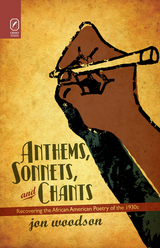
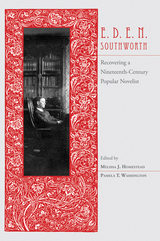
Editors Melissa Homestead and Pamela Washington have gathered twelve original essays from both established and emerging scholars that set a new agenda for the study of E. D. E. N. Southworth’s works. Following an introduction by the editors, these articles are divided into four thematic clusters. The first, “Serial Southworth,” treats her fiction in periodical publication contexts. “Southworth’s Genres,” the second grouping, considers her use of a range of genres beyond the sentimental novel and the domestic novel. In the third part, “Intertextual Southworth,” the essays present intensive case studies of Southworth’s engagement with literary traditions such as Greek and Restoration drama and with her contemporaries such as Harriet Beecher Stowe and French novelist George Sand. Southworth’s focus on social issues and reform figures prominently throughout the volume, but the pieces in the fourth section, “Southworth, Marriage, and the Law,” present a sustained inquiry into the ways in which marriage law and the status of women in the nineteenth century engaged her literary imagination.
The collection concludes with the first chronological bibliography of Southworth’s fiction organized by serialization date rather than book publication. For the first time, scholars will be able to trace the publication history of each novel and will be able to access citations for lesser-known and previously unknown works.
With its fresh approach, this volume will be of great value to students and scholars of American literature, women’s studies, and popular culture studies.
MELISSA J. HOMESTEAD is the Susan J. Rosowski Associate Professor of English at the University of Nebraska–Lincoln. Her book American Women Authors and Literary Property, 1822–1869 includes Southworth, and her articles on American women’s writing have been published in a variety of academic journals.
PAMELA T. WASHINGTON is Professor of English and former dean of the College of Liberal Arts at the University of Central Oklahoma. She is the co-author of Fresh Takes: Explorations in Reading and Writing: A Freshman Composition Text.
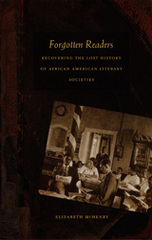
Forgotten Readers expands our definition of literacy and urges us to think of literature as broadly as it was conceived of in the nineteenth century. Elizabeth McHenry delves into archival sources, including the records of past literary societies and the unpublished writings of their members. She examines particular literary associations, including the Saturday Nighters of Washington, D.C., whose members included Jean Toomer and Georgia Douglas Johnson. She shows how black literary societies developed, their relationship to the black press, and the ways that African American women’s clubs—which flourished during the 1890s—encouraged literary activity. In an epilogue, McHenry connects this rich tradition of African American interest in books, reading, and literary conversation to contemporary literary phenomena such as Oprah Winfrey’s book club.

A grandson’s photo album. Old postcards. English porcelain. A granite headstone. These are just a few of the material objects that help reconstruct the histories of colonial people who lived during Japan’s empire. These objects, along with oral histories and visual imagery, reveal aspects of lives that reliance on the colonial archive alone cannot. They help answer the primary question of Lost Histories: Is it possible to write the history of Japan’s colonial subjects? Kirsten Ziomek contends that it is possible, and in the process she brings us closer to understanding the complexities of their lives.
Lost Histories provides a geographically and temporally holistic view of the Japanese empire from the early 1900s to the 1970s. The experiences of the four least-examined groups of Japanese colonial subjects—the Ainu, Taiwan’s indigenous people, Micronesians, and Okinawans—are the centerpiece of the book. By reconstructing individual life histories and following these people as they crossed colonial borders to the metropolis and beyond, Ziomek conveys the dynamic nature of an empire in motion and explains how individuals navigated the vagaries of imperial life.
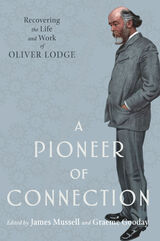

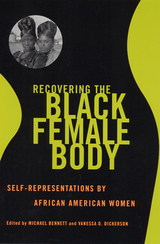
Despite the recent flood of scholarly work investigating the interrelated issues of race, gender, and representation, little has been written about black women’s depictions of their own bodies. Both past and present-day American cultural discourse has attempted either to hypereroticize the black female body or make it a site of impropriety and crime.
The essays in this volume focus on how African American women, from the nineteenth century to the present, have represented their physical selves in opposition to the distorted vision of others. Contributors attempt to “recover” the black female body in two ways: they explore how dominant historical images have mediated black female identity, and they analyze how black women have resisted often demeaning popular cultural perceptions in favor of more diverse, subtle presentations of self.
The pieces in this book—all of them published here for the first time—address a wide range of topics, from antebellum American poetry to nineteenth-century African American actors, and twentieth-century pulp fiction.
Recovering the Black Female Body recognizes the pressing need to highlight through scholarship the vibrant energy of African American women’s attempts to wrest control of the physical and symbolic construction of their bodies away from the distortions of others.
Contributors are Margaret Bass, Dorri Rabung Beam, Michael Bennett, Jacqueline E. Brady, Daphne A. Brooks, Vanessa D. Dickerson, Meredith Goldsmith, Yvette Louis, Ajuan Maria Mance, Noliwe Rooks, Mark Winokur, and Doris Witt. This book also contains a foreword by Carla L. Peterson and an afterword by Deborah E. McDowell.
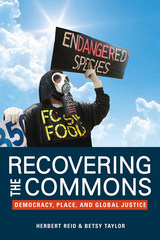
This penetrating work culls key concepts from grassroots activism to hold critical social theory accountable to the needs, ideas, and organizational practices of the global justice movement. The resulting critique of neoliberalism hinges on place-based struggles of groups marginalized by globalization and represents a brave rethinking of politics, economy, culture, and professionalism.
Providing new practical and conceptual tools for responding to human and environmental crises in Appalachia and beyond, Recovering the Commons radically revises the framework of critical social thought regarding our stewardship of the civic and ecological commons. Herbert Reid and Betsy Taylor ally social theory, field sciences, and local knowledge in search of healthy connections among body, place, and commons that form a basis for solidarity as well as a vital infrastructure for a reliable, durable world. Drawing particularly on the work of philosophers Maurice Merleau-Ponty, John Dewey, and Hannah Arendt, the authors reconfigure social theory by ridding it of the aspects that reduce place and community to sets of interchangeable components. Instead, they reconcile complementary pairs such as mind/body and society/nature in the reclamation of public space.
With its analysis embedded in philosophical and material contexts, this penetrating work culls key concepts from grassroots activism to hold critical social theory accountable to the needs, ideas, and organizational practices of the global justice movement. The resulting critique of neoliberalism hinges on place-based struggles of groups marginalized by globalization and represents a brave rethinking of politics, economy, culture, and professionalism.

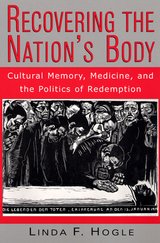
The body is both a site for medical practice and a source of therapeutic and scientific tools. As such, there are a variety of meanings ascribed to the body which both affect and are affected by cultural, economic, political and legal complexities. In order to access and use body parts, Linda F. Hogle states, transformative scientific and cultural processes are brought into play. Nowhere is this more evident than present-day Germany, where the spectre of Nazi medical experimentation still plays a large role in national policies governing the use of body parts and the way these policies are put into practice. In their efforts to be perceived as not repeating atrocities of the past, German medical practitioners and policy-makers reformulate ideas of bodily violation. To further confuse the issue, the reunification of East and West Germany has engendered new questions about the relationship between individuals’ bodies, science, and the state.
Hogle shows how “universal” medicine is reinterpreted through the lens of national and transnational politics and history, using comparative examples from her research in the United. States. Recovering the Nation’s Body is the first book to analyze the actual practices involved in procuring human tissue, and the first to examine how the German past and the unique present-day situation within the European Union are key in understanding the form that medical practices take within various contexts.
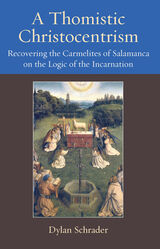
READERS
Browse our collection.
PUBLISHERS
See BiblioVault's publisher services.
STUDENT SERVICES
Files for college accessibility offices.
UChicago Accessibility Resources
home | accessibility | search | about | contact us
BiblioVault ® 2001 - 2024
The University of Chicago Press









